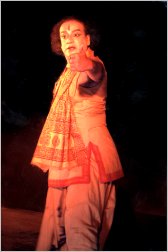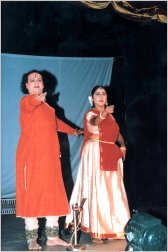 |
 |
Vasudeva-his angst
|
 |
 |
| They
came all the way, Ashim Bandhu Bhattacharjee and his well-trained troupe
from Bengal with an innovative piece, Vasudeva, a Kathak recital. They
performed in all the metros of Kerala.
His dance dramas, dealing with modern philosophies, proclaim that Kathak has entered the complexity of our age, that it has adopted itself to the needs of modern concert halls. Vasudeva is a workshop production based on the life of Lord Krishna. Krishna is depicted as Karma Yogi. The presentation highlights the human aspects of his human incarnation: the strange twists and turns of his eventful life, his basic loneliness, his heroic dimensions, the evolution of his philosophy suggestive of parallels in human history, his triumph, his tragic dilemma, and his awakening into a different dimension of Truth that is really modern. Born in the darkness of prison cells, rescued by the community of cowherds, Krishna's childhood is differently cast. Poothanamoksham and Kaliyamardhanam brand him with a special destiny. Amid the pastoral settings of Vrindavan and the charms of Gopikas, Krishna grows into a youth, the efflorescence of romance. From the flaming love of the youth and charming beauty, Krishna is driven away by destiny. He leaves his enchanting childhood companion, Radha never to return home. Mathura and Kamsavadha is the laboratory from which his new philosophy evolves. Caught in the battles of life for justice, conquering the evil becomes his Karma and Dharma: the philosophical aspects that still rule the Indian thought. Yet in another plane, his lonely soul, ever since the loss of Radha, was yearning for a kindred spirit. He finds it in Draupadi, the epitome of woman - power like a deja vu. Alas, the tragic reality! What a real life situation! But for the circumstances, Krishna nurses his admiration secretly in his heart as he watches her married off. But the abiding passion binds them at a higher level. The modern theme of friendship as with an emotional bond is brought into focus. And whenever she calls for help he has to run to her. And a seed of the Mahabharatha war lies in the deliberate planned attack of brute strength on her. Enough is enough, decides Krishna. He shows his real mettle, his Viswaroopa - is it his power to wipe out the wrong without wielding a single weapon? In his inimitable style he makes the very people whose duty it is to honor their women, to fight and kill those who attacked and dishonored her. 'Destroy the indifferent even if they belong to your older generation, punish the assaulter even if they are your kith and kin'; his message rings loud and strong. 'It is your duty, your work, not mine, I will not touch any weapon.' "Blast your weakness with the strength of your character" is the message of the Gita. He rises like the Kala Purush to establish a new order. The war is won; yet, the war is lost. And, at what cost? Krishna wakes up to the ironic dimension of gain. A moral dilemma haunts him. Did he give the final solution? Caught in the trammels of an existential crises Krishna renounces his life. In India, and in the whole world, we still find the legacy of Kurukshetra at various levels - attack on the weak, assault on women, onslaught upon environment, overpowering the good. What battles can we fight? It was a poignant rendering of the emotional journey of the most fascinating character of Indian literature. The nuances of Kathak , its costume reminiscent of Rasaleela and the perfect music from the CD fused to rework the charm of an unwearied tale. But in dance the beauty of the human figure is as important as the perfection of the movements. A balding Radhakrishna with a body that is neither athletic nor young can never be evocative however perfect the choreography might be. But for that one major flaw it was a beautiful piece. The next day after the demonstration class, we discussed his modern interpretation of the mythical past and of a cult figure. "Our literature is full of metaphors that have told and retold countless variations of the same story. What is needed, is an open mind to read between the lines and beyond the lines", he smiled. What about Krishna's message of Sambhavami yuge yuge? In my mindscape a new thought blazes a trail. Rig Veda speaks of a Krishna, the general, who waged a relentless guerilla war. Krishna in those days meant the 'black guy' as opposed to the white migrant settler. Perhaps, the chain of heroes - the Buddha and his philosophy of Ahimsa, Vivekananda and his Karma yoga, Gandhiji the Apostle of non-violence, the heroes of history are born to shape epochs as Indian philosophical thoughts have evolved amid the shifting sands of time. "Sambhavami
Yuge, yuge".
|